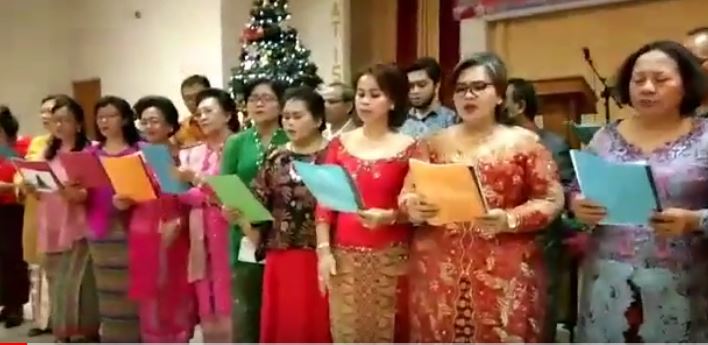Top Stories
-

Keadilan Yang Tidak Adil
-

Ciri Psikopat Bisa Dikenali dari Makanan Kesukaan
-

Tips Ampuh Menghadapi Orang-Orang Toxic di Sekitar Kita
-

Pahlawan Nasional, Antara Kesia-siaan dan Keniscayaan
-

Cara Memilih Durian Agar Tidak Kecewa, Ketahui Ciri-ciri Berikut Ini
-

Ketika Kebohongan Dianggap Strategi dan Korupsi Dijadikan Kreativitas: Negara Sudah Sakit Kanker Ganas
Search
- Details
- Category: International
- By ZA Sitindaon
- Hits: 521
 © WFP/Marco Frattini Thousands of Ukrainians seek safety in neighbouring Poland
© WFP/Marco Frattini Thousands of Ukrainians seek safety in neighbouring Poland
UN humanitarians on Friday described as “unprecedented,” the continuing outflow of children and families fleeing the “relentless shelling” of Russian military action in Ukraine – as they await assurances for the safe passage of relief teams to provide urgently needed assistance.
“500,000 children have been forced to flee their homes in just seven days… unprecedented in scale and speed,” James Elder, spokesperson for the UN Children’s Fund (UNICEF), said via video link from Lviv in western Ukraine.
“As fighting continues of course last night, thousands of children spent another night in freezing and terrifying – terrified – in bunkers under siege. Children must, must, have peace."
Demand outstrips supply
Amid “staggering” numbers of displaced people, UNICEF underscored that humanitarian needs across the country were “multiplying by the hour.”
Hundreds of thousands are without safe drinking water because of damage to system infrastructure and many have been cut off from access to other essential services like healthcare, Mr. Elder said, noting that “tens of thousands of children” remain in child-care institutions, and many are disabled.
“UNICEF’s first convoy of trucks will arrive here later…[with] emergency supplies, water, sanitation kits, midwifery kits,” he continued. “Mothers are having babies in bunkers,”.
“We’ve sent oxygen cylinders to Kiev and have safe tents on borders. But as long as conflict continues, demand will continue to outstrip supply.”
Families visibly shaken
The psychological toll of the barrage of shelling and sirens on countless families fleeing the country is apparent among those arriving at its borders.
Speaking from the Moldovan border with Ukraine, Joung-ah Ghedini-Williams, the communication’s head of UN Refugee Agency, said that the level of fear and trauma was “extremely clear.”
Amidst a line of cars “as far as the eye could see,” Ms. Ghedini-Williams spoke to a mother with her three children in the car and their two dogs.
“They were all very shaken up. The youngest child… a young girl of I would guess around eight or nine, was visibly shaken.”
Life-saving medical supplies
Meanwhile from the Poland-Ukraine border, the World Health Organization’s (WHO) Emergency Medical Team Network Leader, Flavio Salio, said that “the first cargo shipment of trauma supplies, surgical supplies and emergency health supplies and medicines,” arrived yesterday in Warsaw and was now moving towards the border before crossing into Ukraine.
Pending safe access, WHO is also considering medically evacuating civilians.
“I think at this stage safe access will be very critical, both in terms of assets as well as teams that are very willing to provide the needed medical support for the medical care,” he said
Negotiating safe passage
Deeper within the country, the UN humanitarian coordinating office, OCHA, said that many cities have faced relentless shelling
OCHA spokesperson Jens Laerke said that the UN’s Emergency Relief Coordinator, Martin Griffiths, had welcomed reports that the two sides had “agreed to facilitate safe passage” for humanitarian
However, he noted, there has yet to be any official confirmation from the sides in writings..
Fleeing amidst racism
According to the International Organization for Migration (IOM), of the more than 1.2 million people who had fled Ukraine, more than half went to Poland, where the wait time along the Ukrainian-Polish border ranged from 24 to 36 hours.
IOM spokesperson Paul Dillon raised his concern that over 78,000 third-country nationals from 138 countries have been reportedly experiencing xenophobia and racism during their journey.
“Such reports needed to be addressed,” he said.

Babies are cared for in a makeshift perinatal centre located in the basement of a medical complex in Saltivka, a residential district in Kharkiv,
Protect innocent children
With at least 19 children killed and 31 injured during the military action in Ukraine, the UN Child Rights Committee demanded that Russia immediately cease its aggression and military actions.
“Children in Ukraine are currently subject to extreme suffering and trauma. They are being killed and injured…separated from their families…and their daily lives and routines have been utterly shattered,” the UN Human Rights Office said in statement, adding that as a consequence of the military attack, “children are exposed to extreme violence and experience unbearable levels of fear and anxiety”.
The Committee on the Rights of the Child demanded that Russia uphold its obligations under the Convention on the Rights of the Child to protect children from physical and psychological violence “to the utmost degree and as the highest priority.”

A nine-year-old girl and her three-year-old brother arrive at a temporary shelter in Romania after fleeing the conflict in Ukraine with their mother.
Sources: news.un.org
- Details
- Category: International
- By ZA Sitindaon
- Hits: 529
 Russian President Vladimir Putin has signed into law legislation that could punish journalists with up to 15 years in prison for reporting so-called "fake" news about his military invasion of Ukraine. (Yuri Kochetkov/Pool)
Russian President Vladimir Putin has signed into law legislation that could punish journalists with up to 15 years in prison for reporting so-called "fake" news about his military invasion of Ukraine. (Yuri Kochetkov/Pool)
"Moscow has also limited social media as part of a censorship crackdown"
Russian President Vladimir Putin signed into law Friday legislation that would punish journalists with prison time for publishing news that contradicts officials' statements about Moscow's war in Ukraine.
Under the new law, reporters face up to 15 years in prison if they report what authorities deem as false reports about the military. The legislation was passed by both chambers of the Russian parliament.
Tim Davie, the director-general for the BBC, said the law criminalizes independent journalism and said the media outlet has suspended the work of its journalists and staff in Russia.
"Our BBC News service in Russian will continue to operate from outside Russia," he said Thursday. "The safety of our staff is paramount and we are not prepared to expose them to the risk of criminal prosecution simply for doing their jobs."
He added that BBC journalists will continue to report in Ukraine and around the world on the war.
Russian officials have denied media reports of difficulties by the military to advance its invasion of Ukraine amid heavy fighting and nightly airstrikes. They have refused to characterize the conflict as a war or invasion, instead calling it a "special military operation."
Russia has also accused the West of spreading falsehoods about the number of its casualties on the battlefield in an effort to turn the Russian public against the war. Lawmakers provided examples of "fakes" about military operations that include old photos of burned military equipment of the Ukrainian Armed Forces that have been photoshopped to have markings of the Russian military, The Moscow Times reported.
Since the beginning of the military incursion into Ukraine, several Russian media outlets have suspended operations amid pressure from the Kremlin. In addition, Moscow has limited social media – blocking Facebook and Twitter – as part of a censorship crackdown.
Officials said the move came after the company restricted access to state-run media on its platform.
In a Thursday statement, Nick Clegg, Facebook's president of global affairs, said "soon millions of ordinary Russians will find themselves cut off from reliable information, deprived of their everyday ways of connecting with family and friends and silenced from speaking out."
Sources: foxnews.com
- Details
- Category: International
- By ZA Sitindaon
- Hits: 471
 ANADOLU AGENCY VIA GETTY IMAGES -Russia's President Vladimir Putin has just put his country's nuclear forces on "special" alert
ANADOLU AGENCY VIA GETTY IMAGES -Russia's President Vladimir Putin has just put his country's nuclear forces on "special" alert
SitindaonNews.Com | Let me begin with an admission. So many times, I've thought: "Putin would never do this." Then he goes and does it.
"He'd never annex Crimea, surely?" He did.
"He'd never start a war in the Donbas." He did.
"He'd never launch a full-scale invasion of Ukraine." He has.
I've concluded that the phrase "would never do" doesn't apply to Vladimir Putin.
And that raises an uncomfortable question:
"He'd never press the nuclear button first. Would he?"
It's not a theoretical question. Russia's leader has just put his country's nuclear forces on "special" alert, complaining of "aggressive statements" over Ukraine by Nato leaders.
Listen closely to what President Putin has been saying. Last Thursday when he announced on TV his "special military operation" (in reality, a full-scale invasion of Ukraine), he delivered a chilling warning:
"To anyone who would consider interfering from the outside - if you do, you will face consequences greater than any you have faced in history."
"Putin's words sound like a direct threat of nuclear war," believes Nobel Peace Prize laureate Dmitry Muratov, chief editor of the Novaya Gazeta newspaper.
"In that TV address, Putin wasn't acting like the master of the Kremlin, but the master of the planet; in the same way the owner of a flash car shows off by twirling his keyring round his finger, Putin was twirling the nuclear button. He's said many times: if there is no Russia, why do we need the planet? No one paid any attention. But this is a threat that if Russia isn't treated as he wants, then everything will be destroyed."
 AFP VIA GETTY IMAGES - Mr Putin, pictured watching a missile launch in 2005, could resort to more desperate measures if his war in Ukraine is perceived to be failing
AFP VIA GETTY IMAGES - Mr Putin, pictured watching a missile launch in 2005, could resort to more desperate measures if his war in Ukraine is perceived to be failing
In a 2018 documentary, President Putin commented that "…if someone decides to annihilate Russia, we have the legal right to respond. Yes, it will be a catastrophe for humanity and for the world. But I'm a citizen of Russia and its head of state. Why do we need a world without Russia in it?"
Fast forward to 2022. Putin has launched a full-scale war against Ukraine, but the Ukrainian armed forces are putting up stiff resistance; Western nations have - to the Kremlin's surprise - united to impose potentially crippling economic and financial sanctions against Moscow. The very existence of the Putin system may have been put in doubt.
"Putin's in a tight spot," believes Moscow-based defence analyst Pavel Felgenhauer. "He doesn't have many options left, once the West freezes the assets of the Russian Central bank and Russia's financial system actually implodes. That will make the system unworkable.
"One option for him is to cut gas supplies to Europe, hoping that will make the Europeans climb down. Another option is to explode a nuclear weapon somewhere over the North Sea between Britain and Denmark and see what happens."
If Vladimir Putin did choose a nuclear option, would anyone in his close circle try to dissuade him? Or stop him?
"Russia's political elites are never with the people," says Nobel laureate Dmitry Muratov. "They always take the side of the ruler."
And in Vladimir Putin's Russia the ruler is all-powerful. This is a country with few checks and balances; it's the Kremlin that calls the shots.
"No one is ready to stand up to Putin," says Pavel Felgenhauer. "We're in a dangerous spot."
The war in Ukraine is Vladimir Putin's war. If the Kremlin leader achieves his military aims, Ukraine's future as a sovereign nation will be in doubt. If he is perceived to be failing and suffers heavy casualties, the fear is that could prompt the Kremlin to adopt more desperate measures.
Especially if "would never do" no longer applies.
(bbc.com)
- Details
- Category: International
- By ZA Sitindaon
- Hits: 887
Fox News' Trey Yingst reports from Kyiv on Russia's continuing air and ground campaigns against Ukraine.
Fox News' Trey Yingst reported live from Kyiv as Russian jets launched air assaults on a Ukraine airport. Yingst warned that if Russia is able to gain control of the airfield outside the capital, Russia will be able to attack Kyiv from multiple directions which is the "exact worst-case scenario" that analysts warned about.
TREY YINGST: We are getting reports about a military base that is about 15 miles from here, just outside of the Ukrainian capital, that earlier in the day, Russian attack helicopters hit multiple times in an effort to take it over. The big concern here is that if they are able to gain control of this airfield, it is one of the closest military airfields to the Ukrainian capital. If they can control that airfield, they can then start flying in more armored vehicles.
And if they make progress in the north, they're going to be able to hit the city of Kyiv from multiple directions. And it's the exact worst-case scenario that analysts warned about for weeks, that the Russians would come into Ukraine and try to choke off the capital in an effort to change the government. … Ukrainian forces are still trying to push back this Russian invasion, but again, at this hour, Russia continues an air and ground campaign into Ukraine, and Western intelligence officials are warning the capital of Kyiv could fall within days.
- Details
- Category: International
- By ZA Sitindaon
- Hits: 880
Eleven Stop the War supporters were told they risked losing the whip unless they removed names from document
A group of 11 Labour MPs from the left of the party have removed their names from a statement about the invasion of Ukraine, which heavily criticises Nato after being warned they risked losing the party whip.
In a rapid victory for Keir Starmer over MPs still linked to Jeremy Corbyn, the Labour chief whip wrote to the 11 backbenchers asking them to remove their signatures from a statement drawn up by the Stop the War group.
It is understood that Alan Campbell told the group, including Diane Abbott, John McDonnell and Richard Burgon, that they risked losing the Labour whip if they did not remove their names.
A party spokesperson later said all the MPs had agreed to do so.
The Stop the War statement, which accuses the UK government of “sabre-rattling” over Russia’s invasion of Ukraine, also criticises it for saying Ukraine has a right to join Nato if it wishes.
It says the alliance “should call a halt to its eastward expansion and commit to a new security deal for Europe which meets the needs of all states and peoples,” adding: “We refute the idea that Nato is a defensive alliance, and believe its record in Afghanistan, Yugoslavia and Libya over the last generation, not to mention the US-British attack on Iraq, clearly proves otherwise.”
While Corbyn is a long-term Nato sceptic, Starmer has stressed his support for the organisation. Writing in the Guardian earlier this month, the Labour leader said the party’s commitment to Nato “is unshakable”.
He was also heavily critical of Stop the War, which first emerged before the 2003 invasion of Iraq by US and UK forces, and which Corbyn chaired before becoming Labour leader.
The group did not represent “benign voices for peace”, Starmer said, adding: “At best they are naive, at worst they actively give succour to authoritarian leaders who directly threaten democracies. There is nothing progressive in showing solidarity with the aggressor when our allies need our solidarity and – crucially – our practical assistance now more than ever.”
A Labour spokesperson said: “The small number of Labour MPs that signed the Stop The War statement have all now withdrawn their names. This shows Labour is under new management. With Keir Starmer’s leadership there will never be any confusion about whose side Labour is on – Britain, Nato, freedom and democracy – and every Labour MP now understands that.”
The other MPs who signed the Stop the War statement were Tahir Ali, Apsana Begum, Ian Lavery, Ian Mearns, Bell Ribeiro-Addy, Zarah Sultana, Mick Whitley and Beth Winter.
Other signatories included Corbyn, who is sitting as an independent after losing the Labour whip for refusing to rescind comments he made in the aftermath of the publication of the Equality and Human Rights Commission report on Labour’s handling of antisemitism complaints.
It was also signed by Claudia Webbe, the Leicester East MP who was elected for Labour but sits as an independent after being found guilty of a campaign of harassment, including threatening an acid attack, against a woman.
Andrew Scattergood, co-chairman of left-wing campaign group Momentum, said: “These MPs’ steadfast commitment to the Ukrainian people and against Russia’s invasion is beyond question. Indeed, many of them have led the criticism of Putin’s act of aggression today, forcefully and without reservation.
“It beggars belief that the Labour leadership instead focuses on a week-old statement in an attempt to wage factional warfare against them, while a real war wages on against the Ukrainian people.”
Sources: theguardian.com







